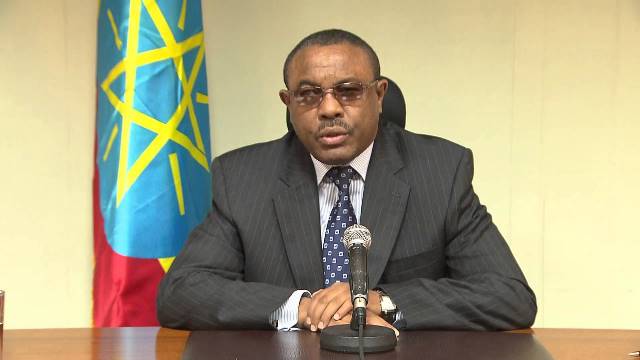Ethiopia on Friday announced a state of emergency after Prime Minister Hailemariam Desalegn announced his intention to step down amid unrest and political crisis.
The state-run Ethiopian Broadcasting Corporation said “the ruling EPRDF coalition’s council met and decided to impose emergency rule in the Horn of Africa country.”
The announcement did not say how long the rule would be in place.
The prime minister’s resignation followed a wave of strikes and demonstrations demanding the release of more opposition leaders.
Over 6,000 political prisoners have been freed since January as the government struggled to placate discontent.
The state broadcasting corporation gave no timeline for the emergency decree, the second since 2016.
It was announced in a statement read by an anchor.
The communique alluded to “ethnic-based clashes” and “chaos and unruliness” as justification for the move.
“In some parts of the country, the constitution and the constitutional system has been bypassed,” it said.
“Because of the dangers the constitution and the constitutional system is facing, we have reached the point where it is difficult to keep the law in the usual way,” it added.
“To be able to protect the constitutional system, declaring a state of emergency has become necessary.”
Ethiopia last declared a state of emergency in October 2016 after months of protests in Oromia — home to the country’s largest ethnicity, the Oromos — and neighbouring Amhara region.
The 10-month decree succeeded in quelling the unrest, which killed hundreds and resulted in tens of thousands of arrests, despite criticism from rights groups.
Read also: Trump wants end to U.S. visa lottery
But anti-government sentiment remained in the two regions and protests continued to erupt sporadically.
The government was further pressured when clashes erupted late last year between the Oromo and Somali ethnicities that would go on to kill hundreds and, per a United Nations estimate, displace one million people.
Last month, Prime Minister Hailemariam Desalegn announced Ethiopia would begin releasing some jailed “politicians.”
The move, he said, sought to “improve the national consensus and widen the democratic platform.”
Tensions boiled over earlier this week when businesses closed and young men armed with rocks and sticks blocked roads in Oromia in a two-day strike to push the government to keep its prisoner amnesty promise.
The strike was called off after detained Oromo politicians were freed along with hundreds of other prisoners including journalist Eskinder Nega and opposition leader Andualem Arage.
The next day, Hailemariam unexpectedly announced he was stepping down, becoming the first leader in modern Ethiopia to do so.
The prime minister said he was leaving to give the ruling Ethiopian People’s Revolutionary Democratic Front (EPRDF) space as it pursued political reforms.
“I myself want to become part of the solution,” he said.
But analysts say his departure was likely caused in part by his inability to unite the four ethnically based parties that constitute the coalition, which has been in power since 1991.
A member of the Wolayta ethnic minority in the country’s south, Hailemariam was seen as lacking the charisma of his predecessor Meles Zenawi, who led the EPRDF to victory over the Derg communist Junta.
Source: Reuters/AFP











